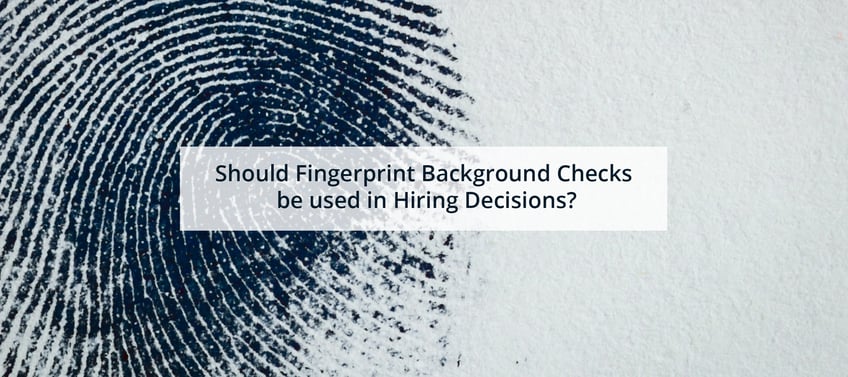Should Fingerprint Background Checks be used in Hiring Decisions?
Fingerprinting has become a widely disputed topic with Uber's recent fight against attempts to fingerprint its drivers. State legislators believe it to be the safest way to ensure drivers, healthcare and childcare workers aren't harmful to those they serve. Matching job candidate fingerprints against the FBI criminal database would seemingly constitute a comprehensive and accurate background check if it didn't actually negatively impact many candidate's opportunities for employment.
When considering an applicant for employment, will fingerprinting tell the whole story?
Fingerprinting 101
Fingerprints can come from a variety of sources including applying for citizenship, adoption, military service, employment, police reports and arrests. No two human beings on the planet have the same fingerprint and thus the fingerprint is regarded one of the premier methods of forensic identification. The FBI has authority of the complete database of fingerprints, the Integrated Automated Fingerprint Identification System (IAFIS). These records also include name, address, military service, employment and any arrest records. Fingerprinting was originally done via ink and paper and only included the thumb. Today's fingerprints include all fingers and is done electronically. While fingerprinting is now used during employment and background identification, it was developed for identifying and tracking criminals. After the terrorist attacks in New York City in 2001, many employers chose to add fingerprinting to their background checks.
FBI Fingerprinting Database Shortcomings
Criminal background checks are generally a part of hiring processes related to security, government, healthcare, taxi drivers, teachers, childcare or any position that serves the public. Not all employers rely on fingerprinting in their criminal background checks. There are several inaccuracies of the FBI fingerprint database such as:
- Failure to report final outcomes of arrests - Being arrested doesn't necessarily mean conviction and employers cannot deny employment due to an arrest record alone, according to the EEOC.
- Incomplete and out-of-date information - Not every conviction is reported to the FBI. Although a state database may have information related to a criminal conviction, they may not report immediately nor be required to report at all to the FBI. In 2013, the National Employment Law Project (NELP) reported that far too many FBI records are both inaccurate, racially-biased and out-of-date and affect job seekers in a negative way.
- Some arrests didn't include fingerprints - Some states and municipalities may choose to not to fingerprint during certain time periods. Other states or counties may fail to report records to the FBI.
- Employers cannot access the FBI database unless authorized by a federal, state or local law. - This limitation means that most employers have to rely on commercial background check companies for accurate data.
Currently there is bi-partisan legislation pending Congressional approval to clean up FBI records for employment screenings. As it stands now, employer fingerprinting could be potentially discriminating to people of color who may have more arrest records that don't necessarily lead to conviction.
Why Rely on Consumer Reporting Agencies Instead?
Considering the chance of potential discrimination in violation of Fair Chance laws, Civil Rights laws and the EEOC, many employers may already be using a CRA or Consumer Reporting Agency for background checks. Here are a few other reasons to consider a third party screening company:
- Comprehensive and accurate data - Because CRA's will seek out many sources for criminal data, including court house records at the national, state and local level, employers are less likely to receive out-of-date information. Screening companies will also offer analysis of the data obtained for accuracy.
- Custom screening solutions - A background screening company will be able to offer a custom package featuring only the background checks you need.
- Compliance assistance - CRA's are subject to consumer protection laws such as the Fair Credit Reporting Act. Because employers must also remain in compliance with these laws, many screening companies will have FCRA certified staff available to answer questions and offer guidance.
- OFAC and E-Verify screens - If employers have concerns about potential applicants, E-Verify offers information regarding immigrant employment status and OFAC (Office of Foreign Assets Control) can inform if the applicant is on the terrorism watch list.
- Applicant disputes are easier - If an applicant notices inaccurate data in a record obtained through a CRA, the dispute process is relatively easy compared to FBI record disputes. When disputing an FBI record, an applicant will often have to trace where the information originated.
Until FBI records are reviewed for accuracy and readily up-to-date and available to employers, using the fingerprint database could cause discrimination in an employer's hiring practices. Working with a third party, objective consumer reporting agency will not only allow the employer to make more informed hiring decisions, but also protect the consumer from missing out on employment opportunities.
Share this
You May Also Like
These Related Stories

Slow Turnaround time for a Background Check? What gives?

Summer Hiring Heats up for Seasonal Staffing and Volunteers


